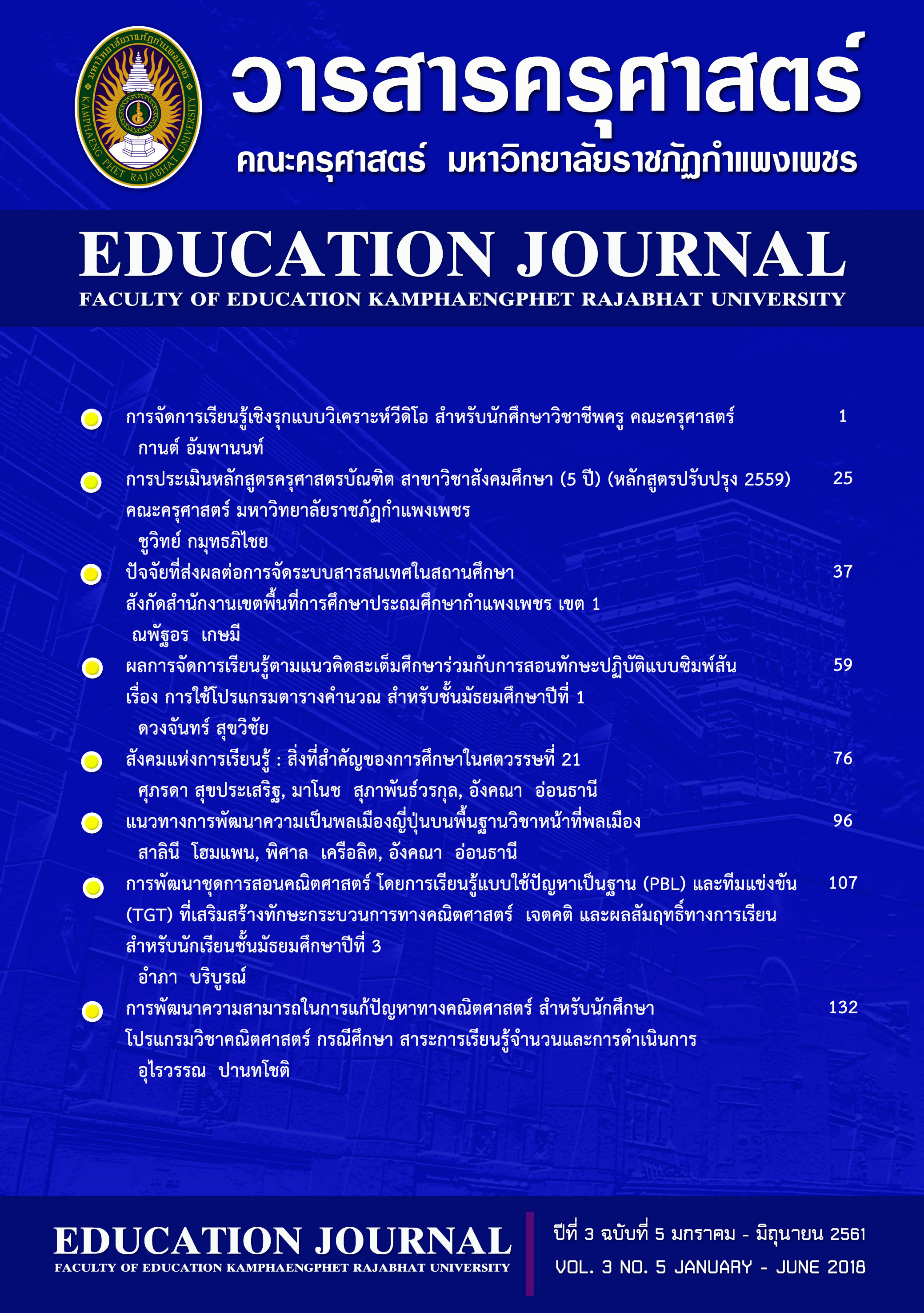THE ASSESSMENT OF B.E. 2559 REVISED BACHELOR’S DEGREE OF EDUCATION CURRICULUM FOR 5 YEAR IN SOCIAL STUDIES, FACULTY OF EDUCATION KAMPHAENGPHET RAJABHAT UNIVERSTIY
Main Article Content
Abstract
This study focused on the assessing the B.E. 2559 revised curriculum of 5 year bachelor’s degree of Education in Social Study organized by the Faculty of Education, Kamphaengphet Rajabhat University. The data in the input and process aspects were collected from the lecturers in the curriculum, graduate students and undergraduate students who enrolling their courses in the 2nd semester of the academic year 2017. The data in the output aspect was collected from the employers’ satisfactions towards the professional operations of graduate students majoring in Social Study, Faculty of Education Kamphaengphet Rajabhat University. The data collection were a questionnaire and criteria for curriculum assessment form which were statistically analyzed through using frequency distribution, mean and standard deviation and presented with the narrative technique. The findings of the study were as follows: 1) The input aspect was respectively rated in overall at a highest level especially the contents of curriculum. 2) The process aspect was respectively rated in overall at a highest level especially the students’ appeal and academic advisor. 3) The output aspect was respectively rated in overall at a highest level especially the Interpersonal Skills and Responsibility. In term of recommendations for further studies served for their implementation of B.E. 2559 revised curriculum of 5 year bachelor’s degree of Education in Social Study organized by the Faculty of Education, Kamphaengphet Rajabhat University, it was also suggested that should add modern subjects for up to date and give students more precision in the subject matter such as allegory subject, the important person in Buddhism, disciples Sawika and the historical person. The world civilization subject should be divided into western and eastern civilizations. In the part of basic and professional courses was suggested that should add the credit all of subjects at 3 credits. There should be a native speaker in the course. The lecturers in curriculum suggested that all of the lecturers should have the academic position. The lecturers had a lot of workload such as research, developed the subject course, academic service and self-assessment report. The internet system should have a more stable and evenly for facilitate to research and design learning management. The employer’s graduate students suggest that the graduate students have high teacher qualifications, work hard, technological skills and creative leadership but some of them lack the characteristics of being teachers and responsibility for work. Students should have a solid knowledge in the subject matter. Have a variety of skills and techniques in teaching. Use IT to organize learning activities. They should improve their English skills.
Article Details

This work is licensed under a Creative Commons Attribution-NonCommercial 4.0 International License.
CC Attribution-NonCommercial-NoDerivatives 4.0
References
กัญจน์ชญาน์ สรรเสริญ. (2551). การประเมินหลักสูตรศึกษาศาสตรมหาบัณฑิต สาขาวิจัยและ ประเมินผลการศึกษา (ฉบับปรับปรุง พ.ศ. 2545). วิทยานิพนธ์ ค.ม. ภาควิชาการศึกษา คณะศึกษาศาสตร์ มหาวิทยาลัยเกษตรศาสตร์.
คณะครุศาสตร์ มหาวิทยาลัยราชภัฏกำแพงเพชร. (2559). หลักสูตรครุศาสตรบัณฑิต หลักสูตร 5ปี สาขาวิชาสังคมศึกษา (หลักสูตรปรับปรุง พ.ศ. 2559). กำแพงเพชร: มหาวิทยาลัยราชภัฏ กำแพงเพชร.
ใจทิพย์ เชื้อรัตนพงษ์. (2539). การพัฒนาหลักสูตร หลักการและแนวปฏิบัติ. กรุงเทพฯ: โรงพิมพ์อลีนเพลส.
โชติ เพชรชื่น. (2528). การประเมินหลักสูตร เอกสารการประชุมเรื่องการประเมินและพัฒนา หลักสูตรการศึกษาระดับปริญญาตรี. กรุงเทพฯ:มหาวิทยาลัยศรีนครินทรวิโรฒ ประสานมิตร.
ทิศนา แขมมณี. (2544). รวมบทความทางการประเมินโครงการ. กรุงเทพฯ : จุฬาลงกรณ์ มหาวิทยาลัย.
นพดล โป่งอ้าย . (2549). การประเมินหลักสูตรวิศวกรรมศาสตรมหาบัณฑิต สาขาวิชาวิศวกรรม อุตสาหกรรม คณะวิศวกรรมศาสตร์ มหาวิทยาลัยเชียงใหม่. วิทยานิพนธ์ ศึกษาศาสตร มหาบัณฑิต มหาวิทยาลัยเชียงใหม่. เชียงใหม่.
นพพร ธนะชัยขันธ์. (2555). สถิติเบื้องต้นสำหรับการวิจัย. พิมพ์ครั้งที่ 2. กรุงเทพฯ: วิทยพัฒณ์.
นิตยา กระภูฤูทธิ์. (2547). การประเมินหลักสูตรศึกษาศาสตรมหาบัณฑิต สาขาวิชาเทคโนโลยี การศึกษามหาวิทยาลัยเชียงใหม่. วิทยานิพนธ์ศึกษาศาสตรมหาบัณฑิตสาขาการวัดและการ ประเมินผลการศึกษา มหาวิทยาลัยเชียงใหม่.
บุญชม ศรีสะอาด. (2553). การวิจัยเบื้องต้น. พิมพ์ครั้งที่8. กรุงเทพฯ: สุวีริยาสาส์น.
บุญช่วย เจริญผล. (2545). การประเมินหลักสูตรสาขาไฟฟ้า (โครงการเงินกู้ธนาคารโลก) สถาบัน เทคโนโลยีราชมงคล. กรุงเทพฯ:สถาบันเทคโนโลยีพระจอมเกล้าพระนครเหนือ.
บุญส่ง นิลแก้ว และคณะ. (2542). เอกสารประกอบการสอนวิจัยการศึกษา. เชียงใหม่: คณะ ศึกษาศาสตร์ มหาวิทยาลัยเชียงใหม่.
ปฏิธรรม สำเนียง. (2551). การประเมินหลักสูตร การศึกษาบัณฑิต [หลักสูตร 5 ปี] มหาวิทยาลัย นเรศวร. วิทยานิพนธ์ ค.ม. ภาควิชาการศึกษา คณะศึกษาศาสตร์ มหาวิทยาลัยนเรศวร.
พัชรินทร์ ศรีสวิสดิ์. (2546). การประเมินหลักสูตรเศรษฐศาสตรมหาบัณฑิต มหาวิทยาลัยเชียงใหม่. วิทยานิพนธ์ ศษ.ม. (วิจัยและสถิติการศึกษา). เชียงใหม่: มหาวิทยาลัยเชียงใหม่.
รุจิร์ ภู่สาระ. (2546). การพัฒนาหลักสูตรตามแนวปฏิรูปการศึกษา. พิมพ์ครั้งที่ 2. กรุงเทพฯ:บุ๊คพอยท์.
วิชัย วงษ์ใหญ่. (2537). กระบวนการพัฒนาหลักสูตรและการเรียนการสอนภาคปฏิบัติ. กรุงเทพฯ.สุวีริยาสาส์น.
ศิริชัย กาญจนวาสี. (2545). “ทฤษฎีการประเมินและการตัดสินใจ”. ใน ประมวลสาระชุดวิชาการประเมินและการจัดการโครงการประเมิน มหาวิทยาลัยสุโขทัยธรรมาธิราช บัณฑิตศึกษา สาขาวิชาศึกษาศาสตร์.
เสริมศรี ไชยศร. (2526). ระบบหลักสูตร-การสอน. เชียงใหม่: พระสิงห์การพิมพ์. สำนักงาน คณะกรรมการการศึกษาแห่งชาติ. (2545). พระราชบัญญัติการศึกษาแห่งชาติ พ.ศ. 2542 แก้ไขเพิ่มเติม (ฉบับที่ 2) พ.ศ. 2545. กรุงเทพฯ: สำนักงานฯ.
สำนักมาตรฐานและประเมินผลอุดมศึกษา. (2549). มาตรฐานการอุดมศึกษาและเกณฑมาตรฐานที่ เกี่ยวข้อง. กรุงเทพฯ: สำนักงานฯ.
สุมิตร คุณานุกร. (2543). หลักสูตรและการสอน. กรุงเทพฯ: โรงพิมพ์ชวนพิมพ์.
สงัด อุทรานันท์. (2532). พื้นฐานและหลักการพัฒนาหลักสูตร. พิมพ์ครั้งที่ 3. กรุงเทพฯ: มิตรสยาม.
Good, Carter V. (1973). Dictionary of Education. New York: McGraw-Hill Book.
Stufflebeam, Daniel L. (1973). Education Evaluation and Decision – Making. inEducational Evaluation: Theory and Practice. P. 128 – 142, Belmont,Californai, Wadsworth Publishing Company.
Stake, Robert E. (1973). The Countenance of Educational Evaluation. in Educational Evaluation: Theory and Practice. P. 170 – 217, Belmont, California, Wadsworth Publishing company.
Taba, Hilda. (1962). Curriculum Development: Theory and Practice. New York: Harcourt Brace & World.
McNeil, Joseph. (1975). The Psychology of Being Human. San Francisco. California: Canfield Press.
Saylor, J. Galen, Alexander, william M.; & Lewis, Arthur J. (1981). Curriculum Planning for Better Teacher and Learning. 4th ed. New York: Holt, Rinehart and Winston.


